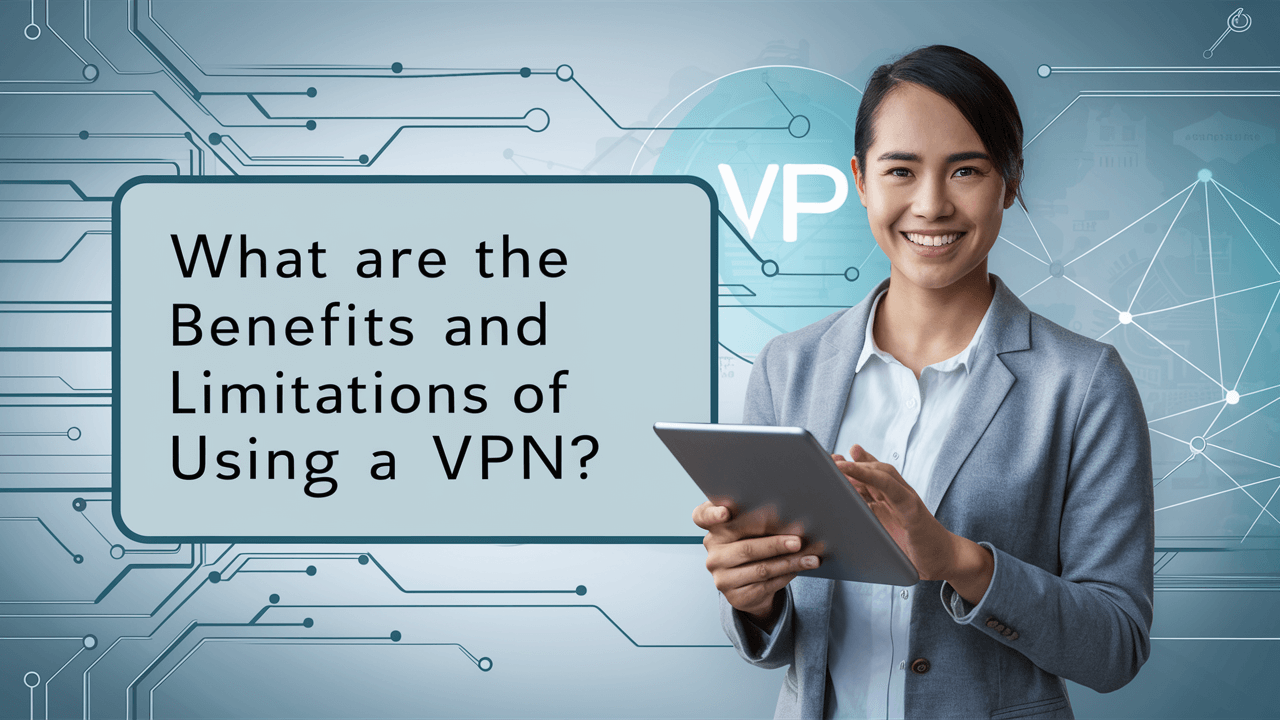If a cybercriminal has seen your unprotected digital trail, they’d see a goldmine, bank logins, browsing habits, or even personal photos. “So, should I use a VPN, or is it another tech trend?”. If you have ever asked this over a coffee or a team huddle, you’re not alone. Virtual Private Networks are more than just buzzwords; they are digital bodyguards. However, let’s not paint an overly rosy picture just yet. While the benefits of VPN network are undeniably substantial, it’s equally important to weigh them against the inherent limitations.
This blog peels back the layers to aid you in understanding the true advantages of virtual private network solutions and where they may fall short.

Jump ahead to
First, What is a VPN?
A VPN, or Virtual Private Network, is a technology that creates a secure, encrypted tunnel between your device and the internet. It is a secure channel established between a user’s device and a remote server operated by a VPN provider. It masks your IP address and encrypts your online activities. This makes you invisible to prying eyes, be it cybercriminals, your ISP, or even government surveillance agencies. The technology plays a pivotal role in both personal privacy and corporate security frameworks. In short, these are indispensable tools for securing digital communication and protecting online identity.
A Balanced View: The Upsides and Limitations of VPN Usage
VPNs can be a breakthrough for privacy and access, but they’re not perfect. There are a few quirks and trade-offs to watch out for. Understanding both the capabilities and limitations of VPN is pivotal to making informed decisions in contexts where digital text is non-negotiable.
The Unbeatable Benefits of VPN Network Use
Let’s kick things off by diving into what makes VPN so incredibly popular. The advantages of Virtual Private Network technology are wide-ranging and can enhance your digital experience.
- Enhanced Online Privacy and Anonymity– One of the key benefits of a VPN network is the cloak of invisibility it provides. Your IP address is hidden, and your online behavior is obscured. This is particularly pivotal in the context where surveillance is omnipresent and data breaches have become almost routine.
- Bypassing Go Restrictions and Censorship– Another imperative advantage of VPN is their ability to bypass regional restrictions on their content. That means, if you want to watch your favorite series that’s not available in your country, a VPN makes it possible. Yet, this is not a luxury to binge-watchers. Journalists and activists in restrictive regimes also rely on VPN to access uncensored content.
- Secure Transmission on Public Wifi– Using a Public WiFi is like shouting secrets in a crowded room. Here, a VPN encrypts your connection, which makes public networks significantly safer, and this is one of the most practical benefits of VPN network security.
- Remote Access for Business Continuity– Especially after the post-pandemic era, remote work is here to stay. VPNs allow employees to access the internal company network from any location securely. This enhances smooth operations and business agility. This is one of the core advantages of virtual private network usage in corporate environments.
- Protection from ISP Throttling– Ever noticed your internet slows down during peak hours? That’s your ISP throttling your bandwidth. VPNs mask your activity, preventing ISPs from identifying and limiting your bandwidth. This is one of the hidden benefits of VPN network performance.
- Improved Cybersecurity Posture– VPN acts like a first line of defense against cyberattacks by addressing surface vulnerabilities. However, it’s not a silver bullet. On the other hand, it’s a strong addition to any cybersecurity toolkit and one of the compelling advantages of virtual private network adoption.
But, It’s Not All Sunshine and Rainbows: Limitations of VPNs
While VPNs are impressive, they are not infallible. Just like every superhero has a weakness, so does this digital guardian.
- Reduce Internet Speed– Encryption comes at a cost. Routing your data through a VPN server can slow down your internet speed. Yet the extent of slowdown depends on factors like server location, encryption strength, and, moreover, VPN provider quality.
- Potential Logging by VPN Providers– It is a truth that all VPNs are created equal. Some free or less reputable providers log your data or even sell it. Definitely, this negates the benefits of VPN privacy and can lead to greater exposure.
- Inaccessibility to Certain Services– Some websites and streaming services block VPN users to comply with licensing agreements or combat fraud. Hence, while bypassing geo restrictions is among the advantages of virtual private network use, it may not always work flawlessly.
- Complex Configuration for Business– Setting up a VPN for organizational use is not plug and play. Certainly, it requires significant planning and IT support. Moreover, misconfigurations can lead to vulnerabilities undermining the benefits of VPN network protection.
- False Sense of Total Security– A VPN is not a substitute for comprehensive cybersecurity. It won’t protect you from phishing, malware, or poor password practices. That implies relying fully on VPN for security is like locking your front door while leaving your windows open.
- Legal and Ethical Considerations– In some countries, using a VPN is restricted or outright illegal. Therefore, always check local regulations before activating one. Moreover, ignorance of the law could turn the advantages of virtual private network usage into unintended consequences.
When Should You Use a VPN?
So, when is a VPN your best friend? Here are some scenarios:
- Working remotely and accessing sensitive corporate data.
- Travelling abroad and needing to use secure public Wi Fi.
- Engaging in cryptocurrency transactions.
- Conducting confidential research or journalism.
- Shopping online in regions with price discrimination.
These examples highlight how the benefits of VPN network connectivity extend beyond casual browsing into pivotal personal and professional applications.
Tips for Maximizing VPN Effectiveness
To truly harness the advantages of a virtual private network technology, you can follow these tips:
- Choose a reputable provider- One can look for zero log policies, strong encryption, moreover good reviews.
- Avoid free VPNs- They often come with hidden costs, like your data.
- Use multifactor authentication( MFA)- Don’t just rely on a VPN; layer your defenses.
- Update VPN software regularly- Stay ahead of vulnerabilities with timely patches.
- Combine with antivirus software- Think of your security stack as a symphony, not a solo performance.
The Verdict: Is a VPN Worth It?
The benefits of VPN network access are undeniable when used wisely. They empower individuals to reclaim their digital privacy and aid organizations in maintaining business continuity. Furthermore, it protects sensitive information from prying eyes. That said, understanding the limitations is equally crucial to avoid over-reliance. In short, VPNs are like umbrellas, great for a rain but not much help in a tornado. They are a piece of the cybersecurity puzzle, not the whole picture.
Conclusion
VPN usage has skyrocketed in recent years, not just among tech-savvy professionals but also everyday users concerned about privacy. The sudden surge is because the benefits of VPN network solutions are hard to ignore. The advantages span from individual privacy to organizational resilience. However, being mindful of the limitations will aid users in making informed and strategic decisions. For professionals looking to dive deeper, VPN Training can be a game-changer. It authenticates individuals with practical skills to configure, manage, and most importantly, optimize VPN use. Definitely, they become valuable in the current cybersecurity-conscious workforce.
FAQs
What are the main benefits of using a VPN?
A VPN provides online privacy and data encryption. In addition, it renders access to restricted content and secures connections on public WiFi networks.
Can a VPN improve internet security?
Yes definitely. It encrypts your data and hides your IP address and thus reducing the risks of cybersecurity threats.
Does a VPN slow down internet speed?
It happens sometimes due to the encryption and server distance. In such scenarios, VPNs can significantly reduce connection speeds.
Are free VPNs safe to use?
It is not always safe to use. This is because many free VPNs may log your data, and moreover, at times, they lack robust security measures.
Can a VPN bypass geo-blocked content?
Yes, certainly, VPNs allow you to access region-blocked websites and services. This is done by masking your location.
Is a VPN a complete cybersecurity solution?
Virtual Private Networks are just one layer of protection, and in fact, they should be used with other security tools.
How does a VPN aid in remote work security?
Virtual Private Networks encrypt remote connections and allow employees to access organizational systems securely from anywhere.
Is a VPN setup easy for a business?
It is not always easy. It may require IT expertise or the support of VPN trained employees for secure and efficient implementation.



